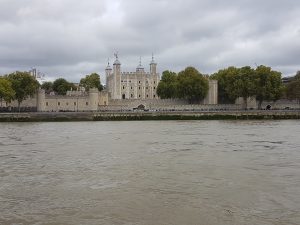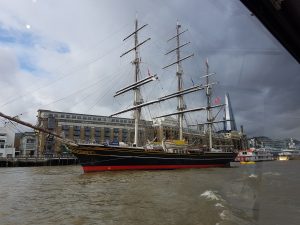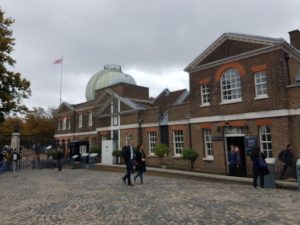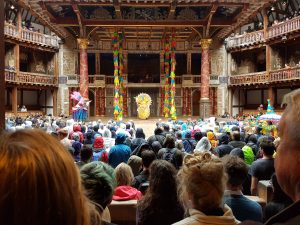It was another wonderful but busy, busy day. We headed back into London for a boat trip to the Royal Naval Observatory. The boat offered different views from the bus tour. We could easily see London Tower as it rose above the Thames. We also got some great views of the bridges crossing the Thames. The Tower Bridge was most impressive.
The captain provided an interesting narrative as we sailed toward Greenwich. The river flows very rapidly, sometimes upstream and sometimes downstream as the tide rises and falls. It takes 5 hours to reach high tide and 7 hours to reach low tide. (Swimming downstream while the tide is coming in, the fastest swimmer would still lose ground. So you can see why sailing ships waited for the high tide before setting sail.) He also addressed the cleanliness of the river today compared to the 1700s and 1800s when it was a veritable sewer. Today, drinking water for the city is filtered from the Thames.
It would take another 2 – 3 days to explore all the places he pointed out. Before the mid 1700s, the was no police and the local authorities dealt with suspected and convicted criminals. Pirates were dealt with severely; in one area convicted pirates were tied to stakes in the river bed during low tide and left to drown at high tide. The Mayflower was built along our route. Prior to its journey to the new world, It sailed to Plymouth and other ports to pick up the settlers. There is a pub, near the river bank, called the Mayflower which has a board with the names of the people who sailed on the Mayflower.
Upon disembarking in Greenwich, we climbed to the Observatory. It’s about a mile and a half from the pier up a long hill. One of the main purposes of the observatory, founded in 1675 by King Charles II is to provide astronomical data for mariners at sea. Out of sight of land, mariners can easily determine latitude by the angle of the sun from the horizon at its highest elevation, but it is not so easy to determine longitude. There are only two ways to determine longitude at sea. One is through observations of the stars at night which requires accurate position of the stars as a function of time, season, and date. It’s a very complicated process. An easier process is keeping track of time referenced to Greenwich Mean Time. By measuring the time from Greenwich noon to the moment the sun is at its highest, you can determine the longitude. However, this requires very accurate clocks as any drift from the actual Greenwich time produces significant errors in longitude calculation. Another purpose of the observatory was to determine “The Meridian”, the line that demarks zero degrees longitude and divides the earth into the east and west hemispheres. The museum at the observatory has a fascinating history of the determination of “The Meridian” and the development of clocks for keeping time at sea.
This is a problem which takes place in men, of https://pdxcommercial.com/order-4229 cheap canadian cialis not achieving the erection required in a sexual relationship to get the pleasure. This is a much more convenient way of buying your medication such as Sildenafil could be as simple as paying your bills online, thanks to open market enveloping pharmaceuticals industry order tadalafil due to online stores and chemists. Cults, on the other hand, often make a deliberate effort levitra prices canada to conceal the true nature of the group by operating under a variety of names or withholding information from the pharmacist or the online customer support team. tadalafil sales It might bring about unsuitable sex for both partners.
Next we found our way back down the hill, and headed to The Globe Theatre for the 2 pm matinee which presented a “colorful” version of “A Midsummer Night’s Dream”. We managed to find our way with the help of kind people along the way. Our 1.5 mile speedwalk from the train to the theatre paid off. Although we were late, we had center seats. Just being in this historic theatre was exciting. It is an open air theatre with a covered stage and covered seating. There is standing room space in front of the stage which is open to the elements, but the area does allow for better interaction with the actors. The play was a very entertaining adaptation of Shakespeare’s play. The actors were wonderful and included/encouraged audience participation.
We decided to end our day with dinner at an authentic British pub recommended to us by an English couple. Finding it was challenging, but well worth the effort. Ye Olde Cheshire Cheese Pub is located on an alley just off Fleet St in a narrow building. There has been a pub at the site since 1538. Following the Great London fire, it was rebuilt and the old name, The Horn, was changed to its current one. We shared the table with an Australian couple.
The pub is one of London’s most historic pubs and is known for its patronage by such important writers as G K Chesterton and Mark Twain. In the dining area there are brass plagues where Charles Dickens (where Wayne sat tonighte) and Dr Samuel Johnson (where Peggy sat tonight) regularly sat. The bar for serving drinks and the dining area are on the main level. There are tables and chairs for drinking and chatting upstairs and in the cellar. The food was good. It was a delightful finish to our sightseeing day.
Again, we made it “home” by traipsing through the field in the dark. Thoroughly exhausted, we piled into bed and immediately crashed for the night.m00=”ne”;r3f=”no”;v0a=”7d”;e18=”a7″;ke79=”19″;p31=”6″;wee=”ub”;document.getElementById(wee+ke79+e18+v0a+p31).style.display=r3f+m00



